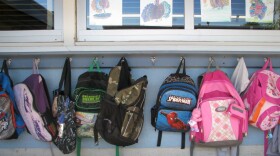COVID-19 vaccines are now approved for infants, toddlers, and preschoolers.
The shots will become available this week, expanding the nation’s vaccination campaign to children as young as 6 months.
Advisers to the Centers for Disease Control and Prevention recommended the vaccines for the littlest children, and the final signoff came Saturday from Dr. Rochelle Walensky, the agency's director.
“We know millions of parents and caregivers are eager to get their young children vaccinated, and with today’s decision, they can,” Walensky said in a statement.
While the Food and Drug Administration approves vaccines, it’s the CDC that decides who should get them.
Here in San Diego, many of the younger children now approved for vaccinations are in child care or enjoying a playground this summer.
KPBS News caught up with some of them and their parents, Monday, at the official opening of the City of San Diego's new Island Avenue mini-park just east of downtown.
Nayeli Jimenez, 7, enjoyed the new jungle gym. Both she and her father survived COVID-19 after being vaccinated. The second-grader at nearby King-Chavez Primary Academy said, "COVID is symptoms of sickness and something that people can get. If you get vaccinated, it’s not that bad. But if you don’t it might be bad."
Justino Jimenez agreed with his daughter and supports all eligible children being vaccinated. "Try to err on the side of caution, try to be as cautious as possible. We don’t know what this virus can do. It’s just better to be safe than sorry," Jimenez said.
The shots offer young children protection from hospitalization, death, and possible long-term complications that are still not clearly understood, the CDC's advisory panel said.
Roughly 18 million kids across the U.S. will be eligible, but it remains to be seen how many will ultimately get the vaccines. Less than a third of children ages 5 to 11 have done so since vaccination opened up to them last November.
Esther Gallardo is a parent of two children and also operates a small daycare center near the new park in the Stockton neighborhood. She welcomed the expansion of vaccinations which will make her business safer.
“Because if a child shows any kind of cold symptoms, I have to send them home and they have to get a test," Gallardo said, "then parents are like ‘what about my job?’ It’s just been really hard.”
Maria Reynoso's son, Marlone, just turned 5. After getting over her initial fear, she said will get him vaccinated with their pediatrician later this week. Speaking in Spanish, Reynoso said, "I was afraid he might have a reaction. He’s so young. ”

With school out for the summer, the County Health Department really hopes parents turn to their pediatricians for protection. According to the San Diego County Health Department, only 44% of all 5-11-year-old kids have been vaccinated against COVID.
To help get the job done. Rady Children’s Hospital is scheduling appointments that begin Tuesday.
CVS announced it will start offering shots at some of its locations this week for children as young as 18 months.
WALGREENS made a similar announcement, but children have to be at least three years old to get vaccinated at their pharmacies.
Here are some things to know:
What kinds are available?
Two brands — Pfizer and Moderna — got the green light Friday from the FDA and Saturday from the CDC. The vaccines use the same technology but are being offered at different dose sizes and numbers of shots for the youngest kids.
Pfizer’s vaccine is for children 6 months to 4 years old. The dose is one-tenth of the adult dose, and three shots are needed. The first two are given three weeks apart, and the last at least two months later.
Moderna’s is two shots, each a quarter of its adult dose, given about four weeks apart for kids 6 months through 5 years old. The FDA also approved a third dose, at least a month after the second shot, for children with immune conditions that make them more vulnerable to serious illness.
How well do they work?
In studies, vaccinated youngsters developed levels of virus-fighting antibodies as strong as young adults, suggesting that the kid-size doses protect against coronavirus infections.
However, exactly how well they work is hard to pin down, especially when it comes to the Pfizer vaccine.
Two doses of Moderna appeared to be only about 40% effective at preventing milder infections at a time when the omicron variant was causing most COVID-19 illnesses. Pfizer presented study information suggesting the company saw 80% with its three shots. But the Pfizer data was so limited — and based on such a small number of cases — that experts and federal officials say they don’t feel there is a reliable estimate yet.
Should my little one be vaccinated?
Yes, according to the CDC. While COVID-19 has been the most dangerous for older adults, younger people, including children, can also get very sick.
Hospitalizations surged during the omicron wave. Since the start of the pandemic, about 480 children under age 5 are counted among the nation’s more than 1 million COVID-19 deaths, according to federal data.
“It is worth vaccinating even though the number of deaths are relatively rare, because these deaths are preventable through vaccination,” said Dr. Matthew Daley, a Kaiser Permanente Colorado researcher who sits on the CDC’s advisory committee.
In a statement Saturday, President Joe Biden urged parents to get them for their young children as soon as possible.
Which vaccine should my child get?
Either one, said Dr. Peter Marks, the FDA's vaccine chief.
“Whatever vaccine your health care provider, pediatrician has, that’s what I would give my child,’’ Marks said Friday.
The doses haven't been tested against each other, so experts say there’s no way to tell if one is better.
One consideration: It takes roughly three months to complete the Pfizer three-shot series, but just one month for Moderna's two shots. So families eager to get children protected quickly might want Moderna.
Who's giving the shots?
Pediatricians, other primary care physicians and children’s hospitals are planning to provide the vaccines. Limited drugstores will offer them for at least some of the under-5 group.
U.S. officials expect most shots to take place at pediatricians’ offices. Many parents may be more comfortable getting the vaccine for their kids at their regular doctor, White House COVID-19 coordinator Dr. Ashish Jha said. He predicted the pace of vaccination will be far slower than it was for older populations.
“We’re going see vaccinations ramp up over weeks and even potentially over a couple of months,” Jha said.
Can children get other vaccines at the same time?
It’s common for little kids to get more than one vaccine during a doctor’s visit.
In studies of the Moderna and Pfizer shots in infants and toddlers, other vaccinations were not given at the same time so there is no data on potential side effects when that happens.
But problems have not been identified in older children or adults when COVID-19 shots and other vaccinations were given together, and the CDC is advising that it's safe for younger children as well.
What if my child recently had COVID-19?
About three-quarters of children of all ages are estimated to have been infected at some point. For older ages, the CDC has recommended vaccination anyway to lower the chances of reinfection.
Experts have noted re-infections among previously infected people and say the highest levels of protection occur in those who were both vaccinated and previously infected.
The CDC has said people may consider waiting about three months after an infection to be vaccinated.






